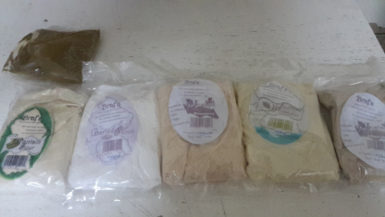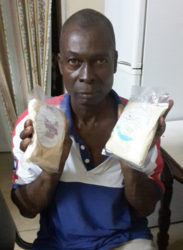Sightless at 59, having lost a battle with untreated Glaucoma some years ago, Lawrence Braithwaite continues to fight a battle for his personal survival in circumstances where lesser men would have thrown in the towel.
The hardy Buxtonian, having initially sought to make a living as a small-scale chicken and vegetable farmer at his homestead in Buxton has, since 2002, turned his attention to agro-processing, a combination of poultry diseases and the challenges of his blindness having finally compelled him to give up on the chicken farming.

It is not difficult to tell, however, that Griffith is far too proud to surrender himself to the pity of the rest of the world and to the charity of the sympathetic. These days, from his 468 East Ruimveldt residence, he runs a registered business enterprise of his own, Braf’s Manufacturing. With a few pieces of domestic equipment pressed into service for a more demanding job than they are designed to do, Braithwaite manufactures plantain flour, barley flour, biscuit porridge mix, tamarind balls and ground nutmeg.

Pride and a determination not to surrender to his limitations have been driving Braithwaite forward. In 2013 he attended an Agriculture Month forum at the Arthur Chung Convention Centre where he not only received advice on registering his enterprise but also on the greater competitiveness to be derived from embracing the regulations of the Government Analyst Food and Drug Department (GA/FDD) associated with issues of packaging and labelling. This was the window through which he was able to have his products accepted for display and sale at the Guyana Marketing Corporation’s Guyana Shop, an accomplishment which he says, he realized through the personal support of the current General Manager of the GMC Ida Sealey-Adams.
Braithwaite, however, makes no secret of the fact that his blindness has been an impediment to the growth of his business. Setting aside the limitations of sightlessness, he is also constrained by the fact that he works alone, finds difficulty in raising capital for growth and has to work with equipment that places limits on his production capacity. Still he soldiers on, citing as some of his real accomplishments the fact that some established supermarkets and other outlets have put his products on their shelves. Still, he says, he wishes that his efforts to secure a measure of assistance from the Small Business Bureau in his quest to acquire more efficient manufacturing had borne fruit.
In order to acquire the raw material with which to manufacture his products, Braithwaite has recruited the services of a taxi driver who accompanies him to market, helps in the purchase of plantains, particularly, then transports them to East Ruimveldt. The current arrangement which Braithwaite says is a costly one, has replaced an earlier arrangement with the owner of a horse-drawn cart, after an incident in which he says, a consignment of plantains was stolen from him.
Braithwaite peels, slices and dries the plantains on his own. It takes 100 pounds of plantains to produce 20 pounds of flour. One gallon of barley provides 6 pounds of flour. It does not require an entrepreneurial wizard to determine that this is not a particularly lucrative operation. To make matters worse, he says, the available evidence suggests that demand for his products may be shrinking. Orders from outlets that used to amount to around a dozen packets of each product per week has now been cut to once every three weeks. Sometimes, he says with a rueful expression that is difficult to ignore, he
wishes he were physically able to sell his products on his own. Still, he stubbornly refuses to give up on his ambition of further growth.
The challenge of sightlessness has meant that Braithwaite has had to recruit an assistant, Rudo Best who becomes his eyes during the production process. Her primary task is to ensure that the sanitation and food safety protocols are strictly observed. He says that Best also doubles as an administrative assistant, supporting him in the areas of packaging and labelling and engaging agencies like the GA/FDD on issues pertaining to product certification.
Braithwaite’s drive and energy in the face of his limitations alone, more than qualifies him for a far greater measure support than he receives. Over time, he has become proficient in the use of a computer and uses the programme JAWS, specially designed for the visually impaired to work on trying continually to improve his labelling. Braithwaite’s immediate needs include a dehydrator and wet and dry mill, which he says will help with his production process.
He talks about the high cost of upgrading his business and about the bureaucratic procedures associated with acquiring institutional help. Inevitably, he says he believes that more should and can be done for differently-abled people who insist on leading productive lives.
Insofar as he is able to, Braithwaite participates in local exhibitions and fairs, hopeful that his products will realize a higher level of market acceptance. Perhaps these days more than at any other juncture in his career as an agro producer he would welcome a measure of outside intervention.




